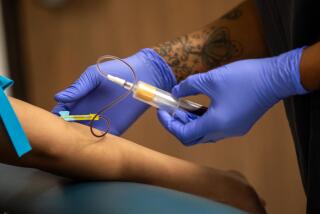HIV testing for all
- Share via
Early treatment for HIV is more successful than later treatment. But that’s not the only reason to praise the recommendation of the U.S. Preventive Services Task Force that doctors should test almost everyone ages 15 to 64 for the virus that causes AIDS.
The U.S. Centers for Disease Control and Prevention reports that 1.2 million people in the United States are infected with HIV but that close to 1 in 5 don’t know it. Even before there was any effective treatment for HIV, large-scale testing as a preventive measure could have kept a tremendous amount of suffering and death at bay. It should have begun years ago. Decades ago.
Fear and prudishness got in the way. During the early years of AIDS, there was widespread ignorance about how easily the infection might be transmitted. A backlash against the groups most commonly associated with the disease — gay males, intravenous drug users and people with multiple sex partners — included attempts to discriminate against them, so that even gay rights groups sometimes fought against testing programs. Ryan White, a middle school student who was infected through a blood transfusion, had to fight in court for the right to attend school. Blood banks put off routine testing, concerned about possible blood shortages. In 1989, the topic of whether to offer screening to all pregnant women was highly controversial. Some pediatric AIDS specialists pointed out that with early information, they might be able to avoid transmission of the virus to the fetus. Others contended that there was too much risk of social isolation for women who tested positive.
Most of us know better now. And no one would be required to undergo the simple test. But if the task force’s draft guidelines are adopted after the four-week comment period, most health insurance will cover the cost and most doctors will offer it to all their patients instead of hanging back lest they offend someone. Even people who don’t engage in high-risk behaviors can be at risk. And if routine testing discovers an infection, not only can patients be treated earlier, but they can protect the health of others around them. The cost of the tests would most likely amount to a fraction of the cost of treating people whose infections might otherwise have been prevented.
The epidemic of AIDS has not been stamped out; what has changed is that it’s no longer the diagnosis of near-certain doom that it was in the earliest years. Had society treated this simply as a public health issue from the start, had doctors tested more routinely early on, some of the disease’s terrible spread could have been avoided. At least we can start now.






